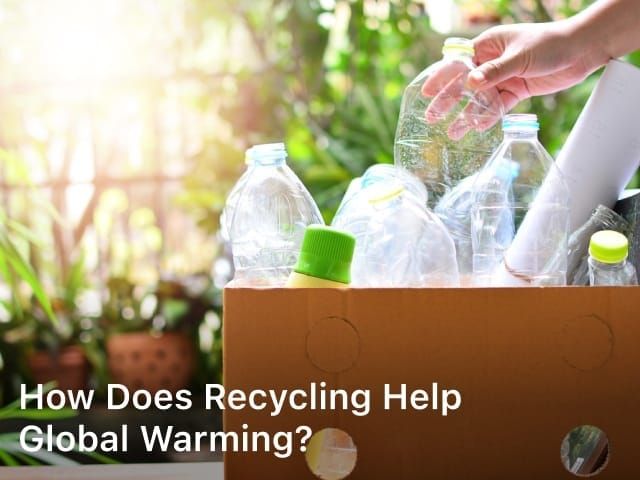How Does Recycling Help Global Warming?

ecowarriornation.com. How Does Recycling Help Global Warming? – Discover how recycling plays a crucial role in mitigating global warming. Explore the environmental impact of recycling, its benefits, and practical ways to contribute to a greener future.
In a world where the effects of climate change are increasingly evident, finding sustainable solutions to combat global warming is paramount. One such solution, often underestimated, is recycling.
Recycling not only conserves valuable resources but also significantly contributes to reducing greenhouse gas emissions. In this comprehensive guide, we delve deep into the question: “How does recycling help global warming?” We’ll explore the various facets of recycling, its environmental impact, and practical steps you can take to make a positive change.
How Does Recycling Help Global Warming?
Recycling is like a superhero in the fight against global warming. It dons a green cape and wields the power to reduce carbon emissions, conserve energy, and protect our planet. Let’s break down how recycling accomplishes these incredible feats:
1. Reducing Greenhouse Gas Emissions
Recycling helps curb the emission of greenhouse gases, such as carbon dioxide (CO2) and methane (CH4), into the atmosphere. How does it work? When we recycle materials like paper, plastic, and glass, we reduce the need for manufacturing new products from raw resources. This means less energy is expended, and fewer emissions are released during the production process.
2. Conserving Energy
The recycling process is considerably more energy-efficient than producing new items from scratch. For example, recycling aluminum cans saves a remarkable 95% of the energy required compared to mining and refining raw aluminum ore. By conserving energy, recycling directly reduces the burning of fossil fuels, which are major contributors to global warming.
3. Preventing Landfill Methane
Landfills are notorious sources of methane, a potent greenhouse gas. When organic waste, like food scraps and yard debris, decomposes in landfills, it generates methane. Recycling organic materials as compost instead of sending them to landfills mitigates methane emissions, a significant win in the battle against global warming.
4. Preserving Natural Resources
Recycling paper and wood products saves forests from being cleared for timber. Trees are vital carbon sinks, absorbing CO2 from the atmosphere. By preserving forests, recycling indirectly helps combat global warming by maintaining these crucial carbon-absorbing ecosystems.
5. Lowering Carbon Footprint
Your carbon footprint decreases when you recycle. By using recycled products and reducing waste, you contribute to a more sustainable lifestyle. Additionally, recycling encourages others to adopt eco-friendly practices, creating a ripple effect that helps combat global warming on a larger scale.

How much does recycling help global warming?
Recycling can help mitigate global warming to some extent, but its impact is relatively modest compared to other actions like reducing greenhouse gas emissions from fossil fuels. Here are some ways recycling can contribute to addressing global warming:
- Energy Savings
Recycling certain materials, such as aluminum and steel, requires significantly less energy than producing these materials from raw resources. By recycling, we reduce the energy consumption associated with mining, refining, and manufacturing, which can help lower greenhouse gas emissions. - Reduced Landfill Methane Emissions
When organic materials like food waste and paper end up in landfills, they decompose and produce methane, a potent greenhouse gas. Recycling and composting these materials instead of sending them to landfills can reduce methane emissions. - Conservation of Resources
Recycling extends the lifespan of materials, reducing the need for virgin resources like trees, minerals, and oil. This conservation can slow down deforestation, habitat destruction, and the extraction of fossil fuels, indirectly helping reduce greenhouse gas emissions associated with these processes. - Decreased Manufacturing Emissions
Recycling can reduce emissions associated with manufacturing new products, as using recycled materials often results in lower emissions compared to using raw materials. For instance, recycling paper saves trees and reduces the energy required for paper production.
While recycling is beneficial, it’s important to recognize that it alone cannot solve the global warming crisis. To make a more significant impact, it should be part of a broader strategy that includes reducing carbon emissions, transitioning to renewable energy sources, improving energy efficiency, and adopting sustainable practices across various sectors of the economy.
Ultimately, the most effective approach to addressing global warming involves a combination of reducing emissions, conserving resources, and transitioning to more sustainable and eco-friendly practices. Recycling plays a valuable role in this larger effort, but it should be viewed as one piece of the puzzle rather than a standalone solution.
FAQs about Recycling and Global Warming
How can I start recycling at home?
Begin by setting up separate bins for recyclables like paper, plastic, and glass. Educate yourself about your local recycling program’s guidelines, and make recycling a daily habit.
Is recycling really effective in reducing global warming?
Yes, recycling is a potent tool in the fight against global warming. By conserving resources and reducing emissions, it plays a vital role in mitigating climate change.
What happens to recyclables after collection?
Recyclables are typically sorted, cleaned, and processed into new products. For example, plastic bottles can be turned into polyester fabric, reducing the need for new plastic production.
Are there items that cannot be recycled?
Yes, certain materials, like contaminated or mixed plastics, are challenging to recycle. It’s essential to follow your local recycling guidelines to ensure you recycle correctly.
Can businesses contribute to global warming mitigation through recycling?
Absolutely! Businesses can adopt sustainable practices such as reducing waste and using recycled materials in their products, significantly impacting global warming efforts.
How can I encourage others to recycle and combat global warming?
Lead by example and educate friends and family about the environmental benefits of recycling. Host recycling workshops or community clean-up events to promote awareness.
Conclusion
Recycling isn’t just about tossing items into separate bins; it’s a powerful weapon against global warming. By reducing greenhouse gas emissions, conserving energy, and preserving natural resources, recycling helps secure a more sustainable future for our planet.
So, the next time you recycle that aluminum can or cardboard box, remember that you’re making a meaningful contribution to the fight against global warming. Embrace the green superhero within you and inspire others to join the cause.
